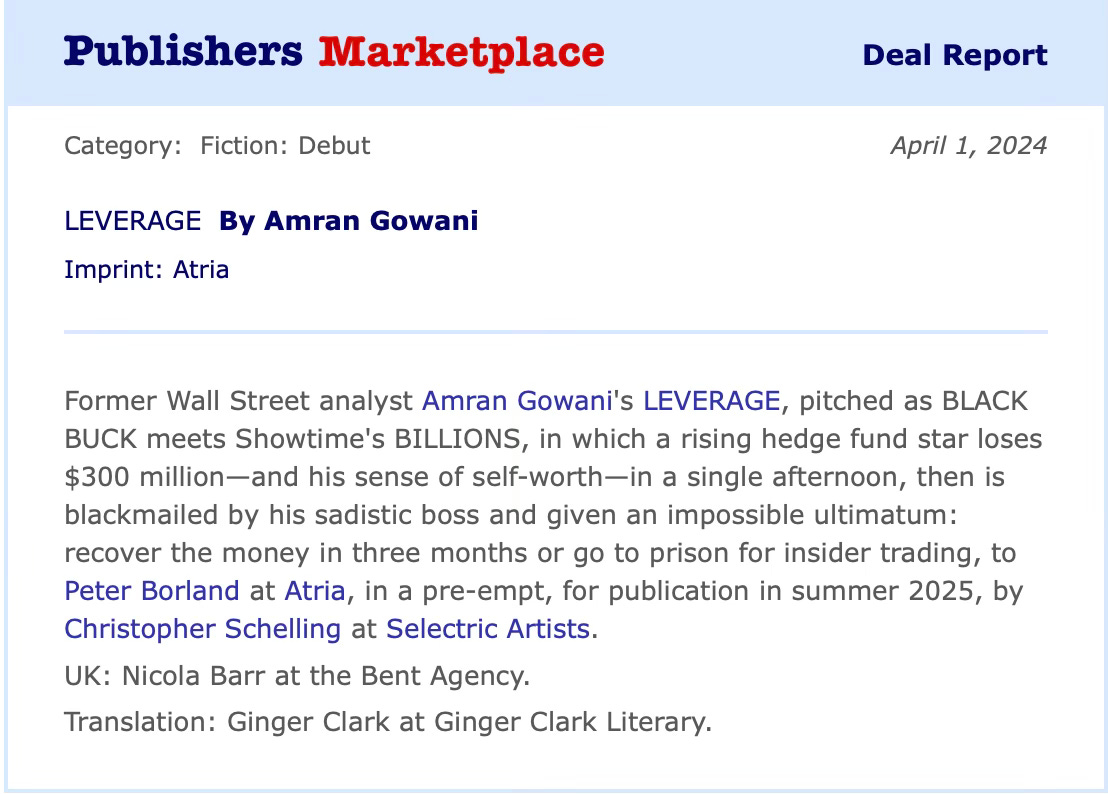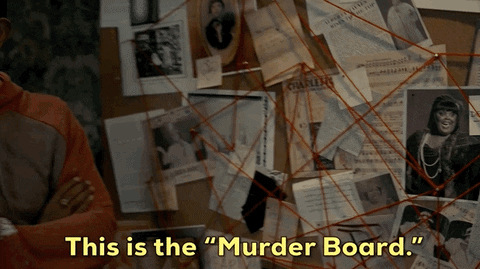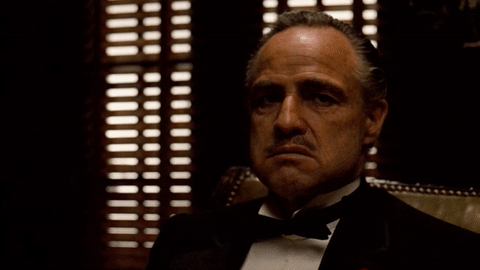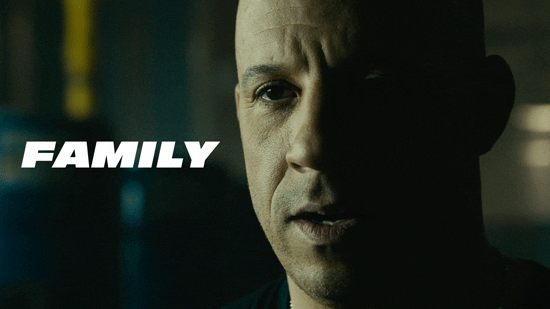Hey Friends,
Welcome back to Field Research, the humor and satire publication written and produced by me, soon-to-be-traditionally-published-yet-certain-to-remain-culturally-irrelevant-author, Amran Gowani.
As you might have surmised, I’m stoked AF about securing an incredible deal for my kickass debut novel, Leverage, and today’s post is part gratuitous victory lap and part satirical self-examination. Thanks in advance for your indulgence, and thanks always for your support.
Enjoy!
You’ve heard it all before.
Writing a novel is a shitty idea. There’s no salary and non-existent benefits. Zero career stability, and the only guarantee is there are no guarantees. Isolation of every imaginable sort — physical, emotional, psychological, sociological, psychosociological, metaphysical — abounds.
Trying to publish1 a novel, especially with a “Big Five” publishing house2, is an even shittier idea. Take all the aforementioned benefits, then mix in the statistical improbability of hooking a bloodsucking literary agent3, the remote possibility an antiquated publishing house will purchase your book4, and the debatably useful and certainly unprofitable sideshow of “building a platform” along the way5.
Why would anyone pursue such a ball-busting enterprise?
That’s the obvious question, which I can only answer by reminding everyone, including myself, madness is an intrinsic element of the human condition.
The more practical question is how one might buck these formidable odds.
Luckily, I’ve systematized the not-at-all-reproducible playbook I used to secure my Big Five book contract. This unique combination of luck and pluck worked for me and almost certainly won’t for you.
Study my preposterously privileged path at your peril.
The essential steps
Every step in my bespoke publishing manual is essential, but the first step is more essential than all the others. You must follow it. You don’t have a choice. There’s no getting around it. In case that’s still not clear, proceeding to Step Two without completing Step One guarantees cataclysmic system failure.
You’ve been warned.
Step One: Blackmail a deep-pocketed benefactor
Ten authors make like ninety percent of the money in traditionally publishing, and spoiler alert: you’re not gonna be one of them.
So, by far the most important step in this process is to find a rich person and strong-arm them into bankrolling you.
My captive patron is my loving wife Felicia, who married me when I was a hotshot MBA graduate, who’d just landed a job at a high-flying investment bank, and who had a lifetime NPV easily in the millions. After knocking her up a few times, and imprisoning her with my dreadful clones, I leaned hard into my midlife crisis, tanked my previously lucrative corporate career, and declared myself a novelist.
Shellshocked, my dear wife’s options became: 1) leave me, and suffer alone with our horrible progeny and money pit of a condo, or 2) float my ridiculous lifestyle and hope it pays off. Bruh, you think titling my novel Leverage was a coincidence?
Before you jot down a single godforsaken word in your ill-fated book, hitch your wagon to someone with actual earning potential and make them an offer they can’t refuse.
Pro tip: Don’t fall for that BS about getting a “real job” so you can pursue your writing endeavors “on the side.” That’s twice as much work, and taking another human hostage is way more empowering.
Step Two: Go back to Step One
Motherfucker, didn’t I tell you not to skip Step One?
Your funeral.
Step Three: Be compelled to write
This step’s fundamental, and speaks to the elusive “why” question above. Simply put, you either have the recessive and deleterious genetic mutations which compel you to write a novel, or you don’t.
Not, I write casually as a creative outlet.
Not, I’ve always loved reading and wanted to try writing my own book.
And certainly not, I’ve dreamed of literary stardom since I was a child.
Empty platitudes don’t fill empty pages.
You and your novel should, at minimum, be unhealthily obsessed with each other, and engaged in a pseudo-productive game of psychological warfare.
Your novel should gnaw at the inside of your skull, constantly asking: why is it taking so long to write me you lazy, talentless hack?
When you’re watching poorly written Netflix shows, and listening to bloated podcasts, and avoiding the wrath of your disappointed investor, your mind should wander to your novel’s characters, plot, structure, stakes, and themes, and contemplate ways to make your novel as good as, if not better, than the ones sitting on bookstore shelves.
Most important of all, while you’re writing your novel, you should be having the goddamned time of your goddamned life, and thinking: this absurd undertaking is the hardest, worst paying, and most satisfying job I’ve ever had.
Nothing less will do.
If you’re not utterly deranged about your novel, it won’t get written. And if you’re not truly compelled to write your novel, but do so anyway, it won’t live.
Step Four: Write dogshit, then write something good
If you’ve reached this stage in your traditional publishing journey, you’ve confirmed you’re unwell enough to write a novel, and you’ve duped somebody else into footing the bill.
It’s now time to actually write your novel, and I’m afraid I have more terrible news: no matter how hard you try, no matter how voraciously you read, and no matter how much craft you study, the first iteration of your novel will fucking suck.
As with Step One, there’s no getting around this part of the process, but there is one secret that will eventually lead you to success.
Never give up.
Ever.
Yes, it’ll become painfully obvious you should quit. Yes, your family and/or spouse and/or children will resent you and your stupid pipe dream. Yes, every moment you waste working on your novel will bring you one step closer to economic Armageddon.
If you want to secure a Big Five book contract, this is the cost of doing business.
In my case, I spent two years writing an absolute clusterfuck of a novel (e.g., underdeveloped protagonist, too many characters, wrong POV, unsatisfying denouement) which also ignored the commercial realities of the marketplace (e.g., unclassifiable genre, offensively long word count for a debut).
Then, I was arrogant enough to query bloodsucking literary agents with my unsellable novel, only to fail miserably in the most unsurprising possible fashion (e.g., zero manuscript requests, partial or otherwise).
Then, against all reason, logic, and good faith, I refused to quit, accepted my wife would never truly love me again, and wrote an entirely new novel.
But then, I improved, and I wrote a kickass novel, and despite more than fifty rejections from bloodsucking literary agents, I snagged an incredible literary agent, who loved and championed my project, and he found a world-class editor, who loves and is championing my project, and we all signed on the dotted line.
The old saw says writing a novel is a marathon. Well, the hidden truth is, writing a saleable novel is the marathon within the marathon. So, whether you ditch your first novel entirely, or toil away for years (or decades) making your dogshit novel not dogshit, you’ll be putting in the work, and inching toward the goal line, and positioning yourself for a chance — just a chance — to become a traditionally published author.
Nobody said this gig was for the sane.
Step Five: Embrace your raging narcissism
Traditional publishing feeds on failure, therefore conventional wisdom says writers should set rock-bottom expectations. They should be humble, stoic, and self-deprecating.
Wrong.
Nothing is more megalomaniacal than believing hundreds, or thousands, or millions of people across the globe will want to read the debauched bullshit which oozed out of your brain — and will willingly pay for the privilege.
Imagining that anyone gives a flying fuck about you or what you have to say is radically, transgressively narcissistic.
Lean into that shit!
I sincerely believe the humans who read my novel will be entertained, and will learn something new, and will develop more empathy, and might even have their lives changed for the better.
That’s an absurd and violently self-absorbed statement. It’s also why I wrote the book.
Think about it this way: if you don’t have unequivocal confidence in your novel, and know in your bones it’s the crucially important piece of art our dying planet desperately needs, then why should anyone else?
Or, as my wife recently said to me: “Only an egomaniacal sociopath can actually manifest their delusions of grandeur.”
Pro tip: You’re not important enough to have impostor syndrome, so get over yourself and get to work6.
Step Six: Leverage your luck
We’ve reached the final step in my foolproof publishing manual (n = 1).
You’ve made the necessary sacrifices. You’ve controlled the controllable variables. You’ve put in the work. You’ve done everything possible to situate your novel for success — and it still won’t be enough.
See, contrary to what McKinsey consultants and neo-eugenicists will have you believe, you can’t just pull on your novel’s bootstraps harder than everyone else and magically get a book deal.
Of course you worked hard on your novel. But so did the other maniacs pursuing this maddening enterprise. Hard work is implicit, a variable endogenous to the game.
The harsh reality is, exogenous variables — luck, randomness, probability, the malevolence of an uncaring, uncompromising, unimpressed universe — play as much as a 99.9% role in all anthropological endeavors, and will influence your path toward traditional publication.
You can’t control these factors, but you can spin them to your advantage.
I’ve been lucky in countless ways.
First of all, I absolutely nailed Step One.
I was also born a brash, confident, loudmouthed, extroverted, borderline sociopath who disdains authority, delights in subverting the system, and relishes proving people wrong. In other words, I’m genetically predisposed to pursue quixotic, futile endeavors like novel writing.
As a kid I suffered neglect and abandonment and depression, but I also had access to healthcare and world-class educational opportunities, which took me all around the country, and thrust me into stressful, exciting, and lucrative jobs, and surrounded me with the shittiest of people, in the craziest of places, at the surrealist of times. Talk about source material!
And all the while, I’ve benefitted from an unshakeable support system, teeming with the smartest, savviest, and most loyal friends imaginable, who encouraged and enabled me to take big swings during this deceptively short period of time we call life.
You can’t pick which circumstances or conditions or constraints will be thrust upon you. You won’t know where your luck will come from, or how it might manifest, or how much you’ll get (if any).
The only certainty is if, like me, you’re foolish enough to write a novel and pursue the path of traditional publication, you’ll damn-sure need some luck on your side, and you’ll damn-sure need to use it.
Big ups to all my supporters!
With my fifteen seconds of literary fame already fading, I want to say a massive thank you to everyone who helped make the sale of my novel possible: my amazing wife Felicia, my belligerent kids, my beta readers — including incredible authors Catherine Baab-Muguira, Andrew Boryga, Dennard Dayle, Meg Oolders, and Martin Seay plus my longest tenured friend Alex — my agent Christopher Schelling and editor Peter Borland, and all of you, who’ve been following my traditional publication journey via this ridiculous newsletter.
I’m thrilled to say the show’s just getting started.
Writing is art. Publishing is business.
The Big Five are: Hachette Livre, HarperCollins, Macmillan, Penguin Random House, and Simon & Schuster.
My agent’s one of the good ones.
Using an anachronistic business model, obv.
Here’s looking at you, Field Research. Also, has anyone seen my Twitter account?
I stole this from Twitter circa 2022 but can’t recall the source.











